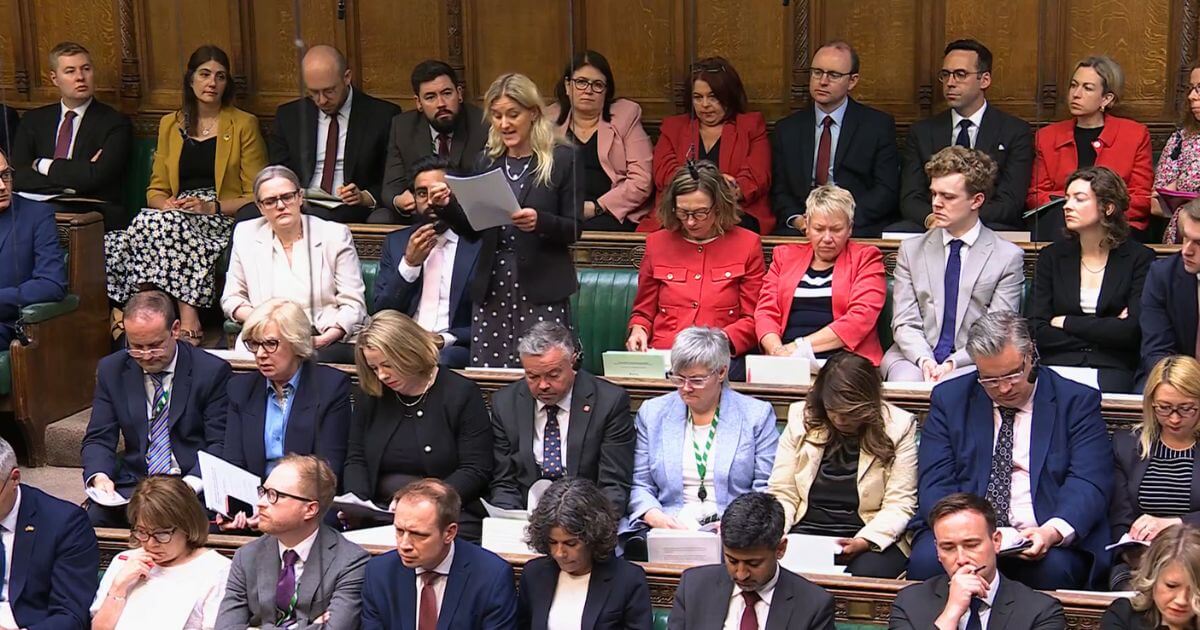As the debate around Kim Leadbeater MP’s assisted suicide Bill continues, the Report Stage debate, during which MPs are supposed to consider amendments to legislation, has revealed even deeper cracks in both the content of the Bill and the chaotic process surrounding it.
MPs from across the political spectrum have raised concerns about the rushed nature of proceedings, the dangerous assumptions baked into the Bill, and the devastating risks it poses to some of the most vulnerable in society.
At the same time, the Bill’s proponents appeared to be on the defensive as the details of the Bill came under scrutiny from MPs.
Rushed debate and a “fundamentally flawed process”
A number of MPs raised concerns about the rushed nature of the debate. While MPs were initially requested to keep their contributions to under 15 minutes, as time went on, this was reduced to five. More than 90 MPs indicated they wished to speak on over 60 amendments in the little over four hours of debate. In the end, only 28 were able to speak.
MPs, both in favour and opposed to the Bill, noted the lack of time for discussion, with Daniel Francis MP among those who had to refuse interventions due to “time constraints”.
Meg Hillier MP echoed this saying “We have not got time to go into the detail that we need to consider”.
Hillier suggested the process of the Bill had been rushed with limited opportunity for MPs outside of the Bill Committee to scrutinise the proposed legislation properly. “We are not a debating society; we are now legislating for a law that would enable the state to assist in people taking their lives. I am sad that we are able to discuss these amendments only now. I did not get the opportunity to be on the Bill Committee”, she added.
Naz Shah MP, who served on the Committee considering the Bill, said the process was “fundamentally flawed”.
“This is not how we make legislation. I take my responsibility extremely seriously, as I am sure everybody in this House does. This is literally a matter of life and death”.
Neil O’Brien MP added his voice to the growing frustration saying “When my constituents ask what I think about this, I have no way of telling them; there is no way for me to get into the nuance of my position on it, because there has been no time to have a proper debate, and so many Members will now be unable to say a single thing about this totally transformative Bill”.
In a shocking moment, Simon Hoare MP called out Kim Leadbeater’s apparent absence from the debating chamber, after she appeared to be absent from the chamber during the debate for about an hour, saying “This is still a private Member’s proposal. How can the promoter of the Bill, the hon. Member for Spen Valley (Kim Leadbeater), respond to whether to accept amendments to her proposed legislation if she is not in the Chamber to hear the arguments? Is it not a discourtesy to the House and those who have spent some considerable time working on amendments, on both sides of the argument, for her not to be here to hear what they are advocating?”.
Vulnerable people will be most at risk
As at Committee Stage, during the debate on Friday, MPs warned that the Bill would expose the vulnerable to immense risk.
Daniel Francis MP, speaking as the father of a child with a disability, shared a disturbing example of an adult with learning disabilities who could be wrongly assumed to have capacity under the Bill’s loose criteria.
“An adult with a learning disability discovers that they have less than six months to live. They have a level of mental capacity that allows them to make many decisions in life. They have enough capacity to understand that they could be a burden on their elderly parents”.
“Their elderly parents might take the view that their son or daughter requires support to make the most complex decisions, yet because their son or daughter is assumed to have capacity under the first principle of the Mental Capacity Act, they could go through the entirety of this process—and the first time that the parents were aware of it would be when they were informed that their child had been assisted to die”.
“[T]he Mental Capacity Act 2005 was not written for this scenario”, he cautioned.
During Committee stage, Danny Kruger reminded the Committee that “It is the [Royal College of Psychiatrists’] view that the MCA [Mental Capacity Act] is not sufficient for the purposes of [Leadbeater’s] Bill”.
Carla Lockhart MP highlighted the particular danger the Bill poses to people with Down’s syndrome and disabilities, saying it was “weaker than it was before the Committee began”. Meanwhile, Sarah Olney MP said “the fundamental question was whether we were putting vulnerable people at risk by passing this legislation”. Her answer – “On balance, we are.”
Autonomy, pressure and coercion
MPs across the political spectrum, including Jess Asato, Tim Farron, Anneliese Dodds, and Sir John Hayes, all drew attention to the insufficiency of autonomy-based arguments for assisted suicide and warned of the danger of people ending their lives under this Bill due to concerns about being a burden.
Asato asked “what if [the person seeking assisted suicide is] not autonomous because they are being coercively controlled by a partner? What if that partner has prevented them from reaching out to their family to let them know that they are going to take an assisted death? Would it not be a great safeguard to ensure that the panel and all the doctors around them had ascertained that the family had been told?”.
Anneliese Dodds MP also raised the disturbing trend of using “terminal anorexia” as a justification for assisted suicide. She noted that in the Netherlands, assisted deaths for psychiatric reasons rose from just two in 2010 to 138 in 2023.
Sir John Hayes MP pointed to overseas evidence showing that people often pursue assisted suicide not due to pain, but because they feel like a burden on others. “In other jurisdictions that have passed such laws, up to a third of people report that they have taken this step because they feel they are a burden on others. That is the truth of it—it is not always about pain—and that is the kind of autonomy that leads to disaster” he said.
More harm than good
Rebecca Paul MP said “I am not against assisted dying in principle, but I am against this Bill. I am happy to put it on the record now that I have no personal religious beliefs; I am against the Bill for the simple reason that it will harm far more people than it will help. The people who will be harmed are the most vulnerable in our communities, and I am not willing to accept that collateral damage”.
In a troubling moment, Leadbeater appeared to shrug off concerns that people with anorexia could access assisted suicide, saying “if a patient was so ill as a result of not eating and drinking for whatever reason, they would die before the process of assisted dying was able to take place, as it could take up to two months to complete all the stages of the process as set out in the Bill”.
Sarah Bool MP, who has diabetes, raised the danger that even people with chronic but treatable conditions like diabetes or eating disorders could be captured under the Bill.
“I have spoken to the hon. Member for Spen Valley about my concern that conditions like diabetes may be caught unintentionally. The amendment would be a step to protect those who may be unable to protect themselves using standard means. Diabetes and anorexia have been a reason for assisted suicide in Oregon, so please be aware of what could happen”.
“On a personal note, not long after I was diagnosed as a type 1 diabetic, I suffered diabetic distress. I did not know how I could continue with this condition, but I convinced every single person at my workplace that I was absolutely fine. It was only because my parents caught it that I am in this position today, and was able to get support. Please think seriously about the unintended consequences, and protect vulnerable people like me” she said.
Dr Ben Spencer MP emphasised that assisted suicide “is not a medical treatment, but a personal choice about life and death”.
Pro-assisted suicide MP Tom Gordon defended his amendment seeking to expand the eligibility criteria saying that it “seeks a simple yet crucial change to extend the eligibility period for those with neurodegenerative conditions, from six months to 12 months, something that is already reflected in legislation in five of six Australian states”.












